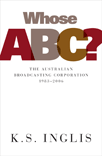I’ve just read the first 100 pages of Whose ABC? The Australian Broadcasting Corporation 1983-2006. I’m enjoying the journey, but I’m wondering if “eminent historian” K S Inglis is talking about the same organisation where I worked from 1984 to 1991.
You see, at my ABC we used to make programs.
Inglis’ ABC is a boardroom, a managing director’s office, and the occasional brawl with politicians.
So while I half-recognise what he’s talking about — someone called Geoffrey Whitehead as MD, the re-naming of Radio Two to Radio National and all that — very little of what he’s saying seems to reflect the day-to-day reality of broadcasting.
Here’s all he has to say about Mother and Son, one of Australia’s most successful TV comedies:
The adroit drama series, Mother and Son, a ‘situation comedy’ written by Geoffrey Atherden and performed by Ruth Cracknell as foxy old mother and Garry McDonald as outwitted balding son, happened to be housed in the department of music and entertainment.
That’s it. Nothing about the style of the program or its success, just the politics of it not being produced by the drama department.
And the next two sentences are all he has to say about one of Australia’s most important cultural institutions:
That conglomerate [the music and entertainment department] put out a variety of items from symphony orchestra concerts to the venerableCountdown, an hour of pop music in which rock stars mimed to their own recordings. This was the only program outside the department of children’s and education created for young people, and remained by far the most popular ABC program with viewers from ten to seventeen years old.
And that’s it. Presenter Ian “Molly” Meldrum doesn’t even rate a mention, nor does the ill-fated Countdown Revolution resurrection attempt of 1989.
You’d think that maybe a paragraph, gosh, perhaps even a page about each of these more-than-successful programs might be warranted? Perhaps something about how they reflected and shaped Australian society? You know, those… what do you call them? Yes, the audience.
Somehow it seems far more important to mention which school the presenters went to.
Geraldine Doogue, a vivacious and glamorous presence in Nationwide… had been educated in Perth by Sisters of Mercy and teachers at the University of Western Australia…
So quaint. So terribly old-school establishment.
Also rather quaint is Inglis’ reference to radio “sessions” which are “conducted” by someone. Even back in the 80s we talked about “programs” which had “presenters”.
While a history of the ABC does need to cover its management, strategies and political governance, surely there should be just as much importance placed on the programs, the program-makers and the audience?

